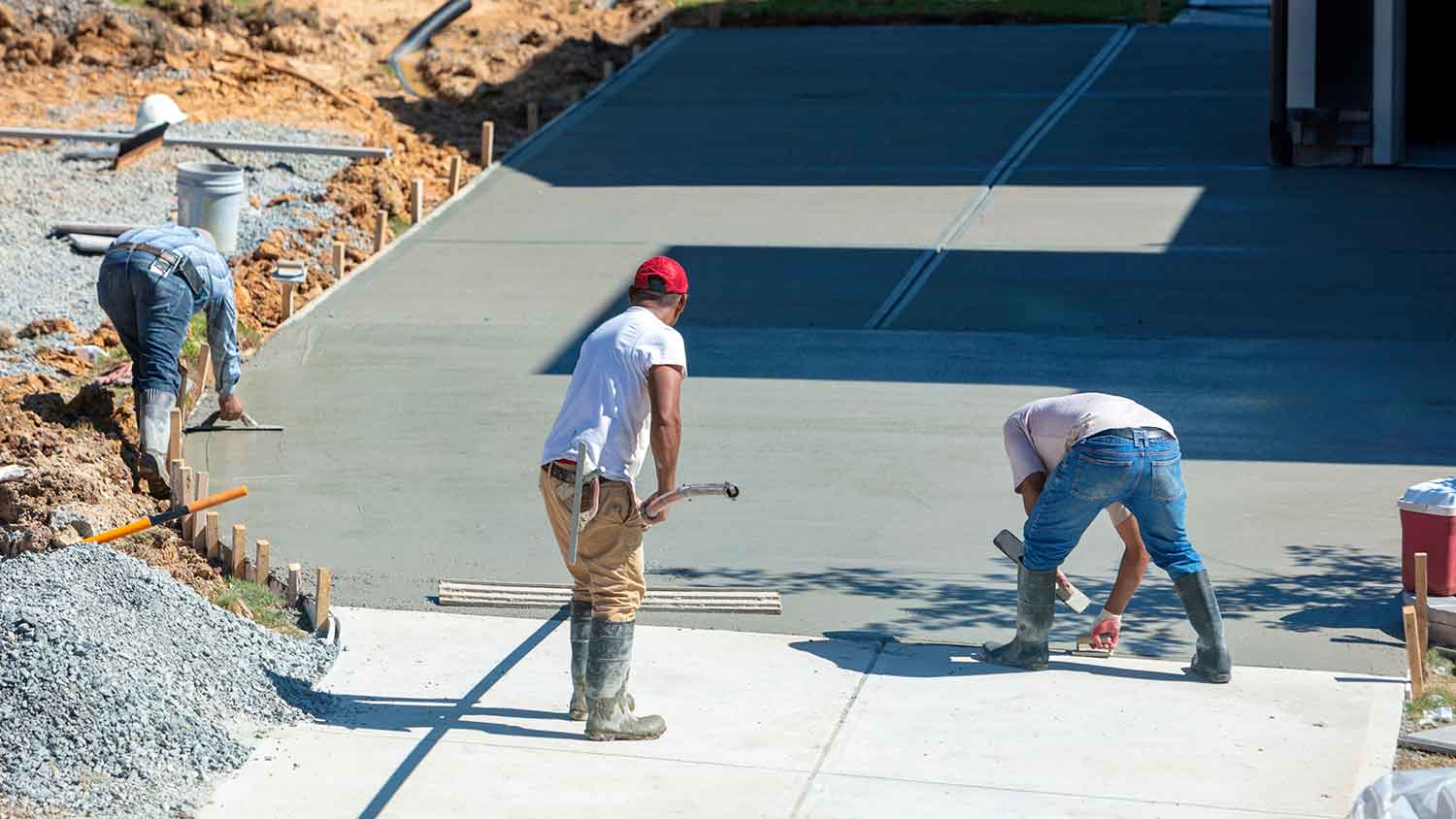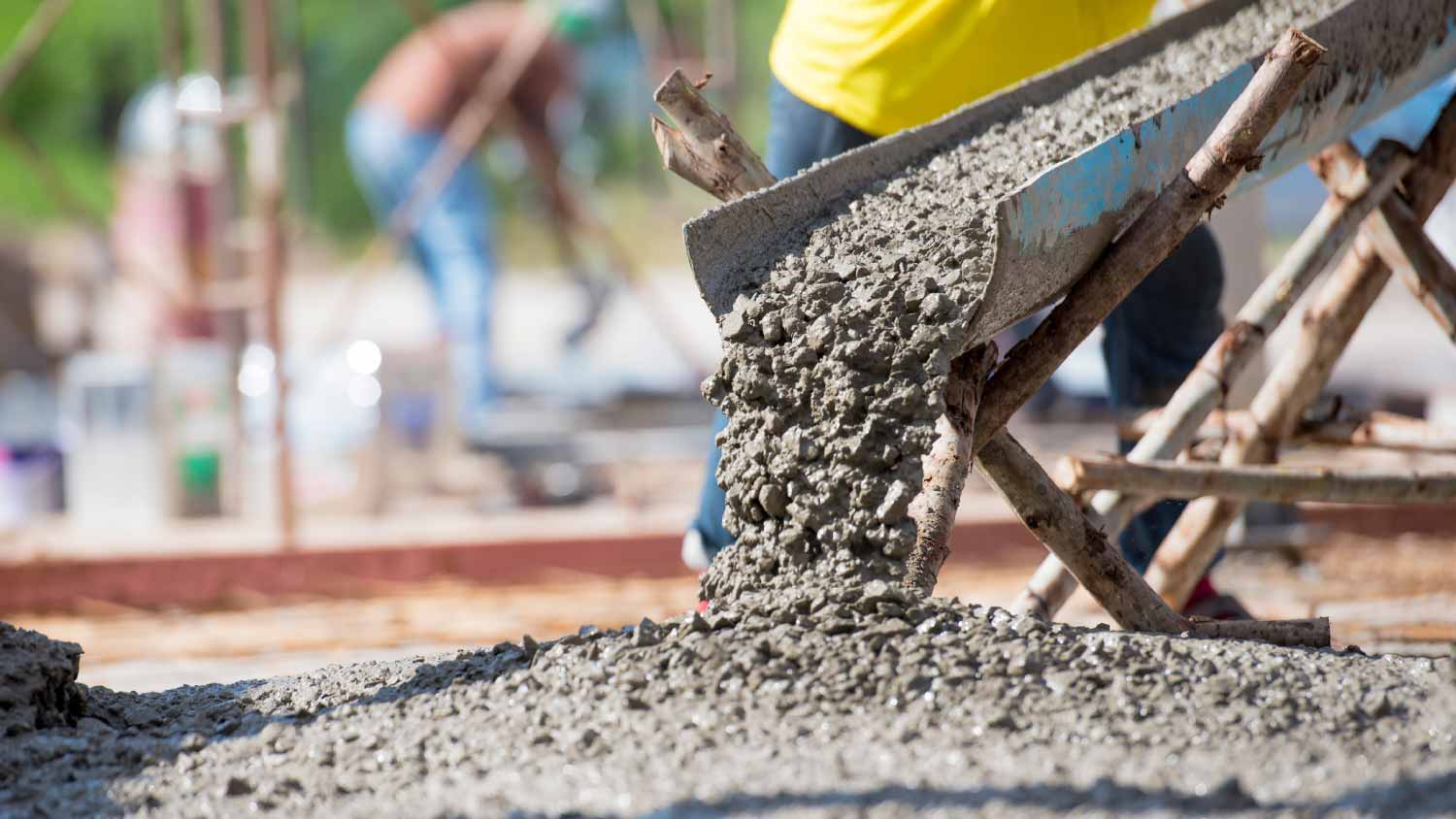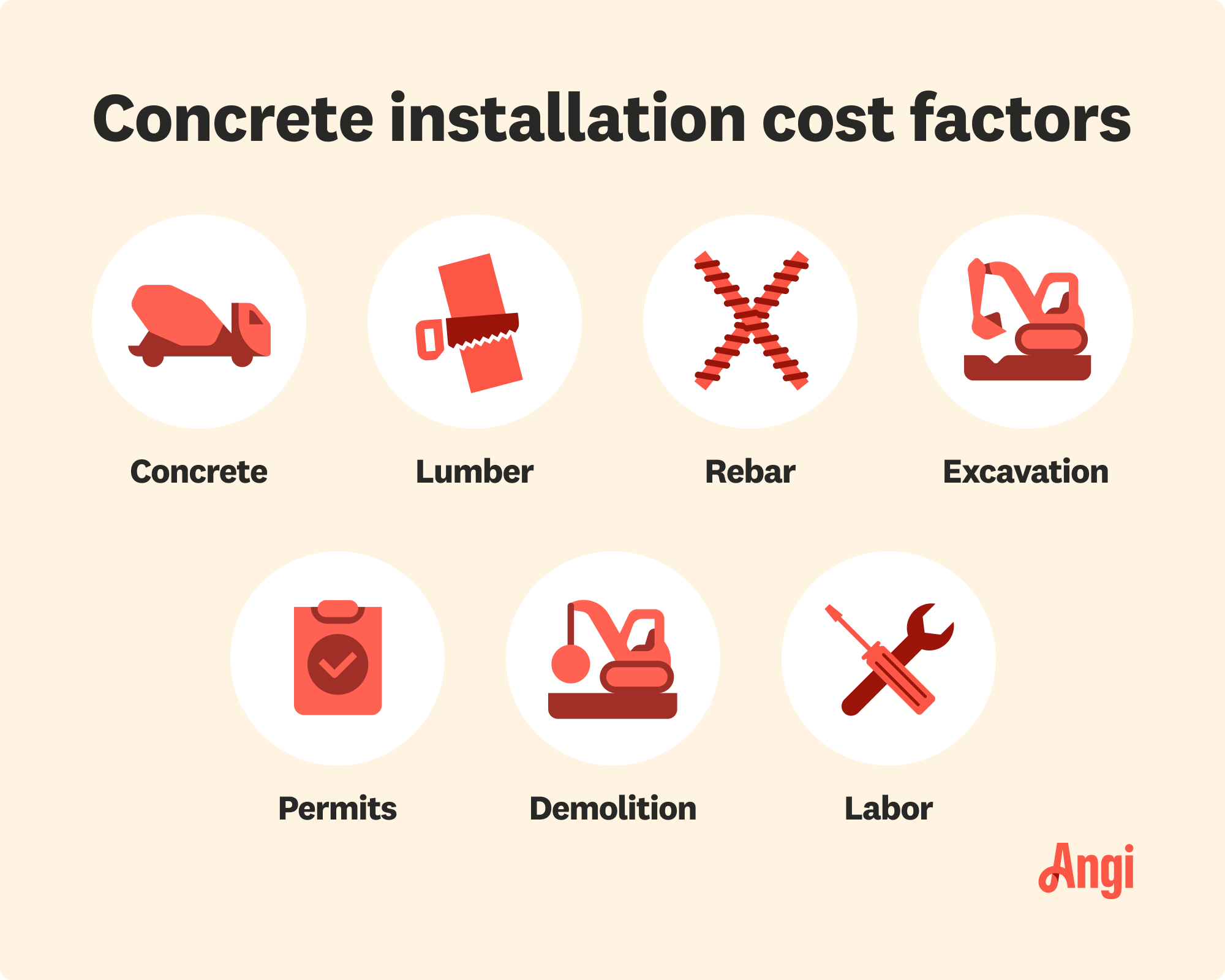
Discover the average concrete pumping cost, including key price factors and tips to help you budget for your next concrete project.
There’s no concrete answer to this question


Permit requirements for concrete work depend on local regulations.
The size and type of concrete work can dictate if a permit is needed.
Permits are usually required for enclosed structures, steps, and driveways.
When it comes time to install a new patio, walkway, or driveway, you may be wondering if you need a permit to pour concrete. The short answer? It depends. Various factors can determine if you need to pull a permit, and regulations differ based on location. It’s always best to verify if you need a permit before you start pouring concrete to avoid fines, citations, and even difficulty selling your home in the future.
So, how can you tell if you need a permit to pour concrete? You should always verify with your contractor or with your local building department, but there are some rules of thumb you can use to figure out if you’ll need a permit before you get started.
In many places, local governments may restrict the size of features like patios, driveways, and retaining walls. Some areas may limit the width, length, or height of these features, so you’ll want to ensure you’re staying within the legal guidelines. In addition, if your home is governed by an HOA or board, these organizations may have rules of their own.
If your concrete project falls outside of those limits, you may need a special permit for zoning variances, even if the project itself doesn’t require a permit.
Pouring concrete for a ground-level feature like a patio or walkway is less likely to require a permit than a raised structure. Almost all municipalities require a permit for anything over 30 inches off the ground. Since poured concrete is considered a permanent improvement, you may need a permit for your patio, even if it falls under that height.
You’ll almost certainly need a permit if your concrete project requires excavation. Excavation requirements can be stringent to ensure safety, structural stability, and the protection of underground utilities. Excavation permits can cost anywhere from $50 to $400, depending on your municipality and the type of work being performed.
Even in municipalities that don’t require a permit for certain types of concrete work, you may need to pull one if your home is in an environmental protection zone. These areas have requirements regarding what work you can and can’t perform due to specific environmental conditions and concerns. If you live on or near a wetland or in close proximity to a stream or river, you’re much more likely to need a permit for your construction project.
An open concrete patio at ground level may not need a permit, but if you’re building an enclosed or covered patio, you’ll always need to pull a permit since the structure will then be subject to local building codes. Your municipality also uses permits to inform tax assessments, so a major improvement like a home add-on or bump-out will require a permit for your local government to tax you appropriately.

If you’re in or preparing for the building phase already, call your local building department or your contractor to confirm if a permit is necessary. If you’re in the planning phase, you can get an idea about the permit requirements based on the type of concrete project you’re completing.
In most places, pouring a ground-level patio will not require a permit unless excavation is necessary. Verify local patio size and placement requirements before getting started. Concrete patios cost between $15 and $30 per square foot, and permit fees, if you need to pay them in your area, will add between $75 and $200 to your total.
Concrete walkways fully contained within your property lines don’t usually require a permit, but some municipalities may have local restrictions requiring any concrete work to be permitted. Installing a concrete walkway can range from $850 to $3400, so confirm if you need to factor the permit cost into the total project cost. If you do, expect to pay between $75 and $200 extra.
Municipalities often restrict driveway size and placement, and many driveways will require excavation to allow for thicker concrete to support vehicles, so you’ll likely need a permit before starting work. If you hire a concrete contractor, the cost of a concrete driveway will likely include permit fees, which can total between $100 and $300.
Poured concrete steps and precast concrete steps are subject to building codes and almost always require a permit. New concrete steps cost an average of $3500, including the cost of a permit.
If you’re pouring a home foundation, whether it’s a slab-on-grade foundation or a basement floor, you will always need a building permit. This kind of construction project requires the help of a concrete flooring company, and they will normally make sure they have the proper permits pulled before getting started on your project.

General rules are great to know for planning purposes, but when it comes time to do the actual concrete work, you’ll need to know how to verify if you need a permit. You have two options to confirm: contact your local building department or ask your contractor.
Before starting work on any concrete project, contact your local zoning or building department to uncover any requirements and restrictions that may affect your project. It’s better to be sure of permitting rules before beginning your project instead of running into problems like fines or citations after you’ve poured the concrete.
If you’re working with a local concrete company, they’ll be able to let you know whether the job requires a permit or not. In most cases, your contractor will pull the necessary permits for the work and ensure everything follows the proper guidelines. Most professionals will also schedule any final inspections necessary to close out your building permits once construction is complete.
"While many things can be "DIY," we seriously recommend hiring a professional for concrete work. The number of "small jobs" homeowners start and then ask us to come in and fix is very high. "
— Mitch Coluzzi, Head of Construction at SoldFast
If your project requires a permit and you move forward without one, your local building department can impose fines or require you to return your property to its original condition.
If your building department is able to issue a permit retrospectively, meaning your project would have been safe and legal if you had gotten a permit originally, they’ll likely issue fines and require that you pull a permit for the work. That means you’ll need to pay the original permit cost in addition to violation fees. In some areas, failure to pull the required permits and pay the fees will result in additional fees.
For projects that aren’t permittable, like those that violate zoning regulations, your building department will issue violation fees and require you to return your property to its pre-construction condition. You’ll be on the hook for fees and have to pay to remove the concrete structure you poured.
In all cases, it’s well worth the time and money to research if you need permits and to pay for them before you begin your project.
Pulling a permit for a concrete project is as simple as filing a permit request form with your local building department. You can go into the building department and ask for the appropriate form, and the clerk should be able to help guide you through the process. You’ll need to pay the permit fee and submit the request form. Just make sure you wait for the permit approval before you begin your project. It will normally come in the mail or be available for pickup at your building department.
If you hire a professional to complete your concrete project, they will often pull the necessary permits for you, so you don’t have to worry about filing paperwork. You’ll still need to pay the permit fees, which your pro will include in their invoice. Most reputable pros will carry out permitting automatically, but you should always ask before hiring to confirm they’ll take the necessary steps to keep your project legal.
Excellent service from Denis Very polite guy as well inspected my house for free for minor repairs.
Professional and efficient AC repair AC repair from Green City Pros! Jimmy was courteous and had our AC running smoothly in no time. Thumbs up for the excellent service, guys !
They repaired a leak in my roof. I found them to be very friendly and knowledgeable. They arrived when they said they would and didn't keep me waiting. They made the repair and then inspected the rest of the roof and sealed all of the other flashings. Great job!
Journey Builders performed a thorough inspection of my home and provided me with a reasonable estimate to repair my roof. Their honesty and integrity impressed me. They really made working with them a very simple process.
Francis was awesome! Extremely professional and willing to resolve issues. I truly appreciated his hard work and will definitely use his company for my future projects.
quick and expert diagnosis and repair. fair price. great service and no headaches
I've been wanting to have my home redecorated and I wanted to start with my front lawn. They had great ideas of putting in a new kind of landscaping design and concrete curbs. Great service and very creative team!
Professional, courteous and great quality. Would hire the team again.
Doug did an outstanding job. We contacted him back in July (based on his reviews on Angie's List)-- because we needed some carpentry work done at our home in Westhampton Beach. He was on time (actually arrived early for our first meeting), reliable, a pleasure to deal with and most of all his...
From average costs to expert advice, get all the answers you need to get your job done.

Discover the average concrete pumping cost, including key price factors and tips to help you budget for your next concrete project.

Installing new concrete steps can enhance your home’s curb appeal. Learn all the factors that can affect your concrete steps cost.

If your sidewalk is in need of some TLC, this is your comprehensive look at sidewalk replacement cost, so you know what to expect.

Hairline cracks in your driveway, walkway, slab, or garage floor are common, but not ideal. Learn what to do about new concrete cracking.

Cutting concrete is a daunting task unless you have the right tools and know-how. Find out the methods for how to cut concrete for all skill levels.

While mortar and concrete look like similar composites, they serve very different roles around the house. Here’s how they differ in application, cost, and more.